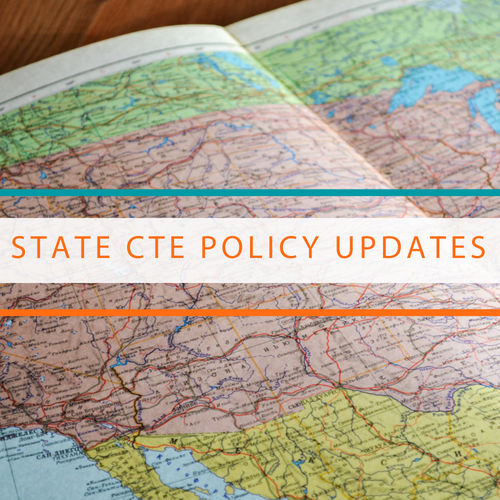 State education agencies, legislators and educators faced significant challenges from the coronavirus pandemic, including adapting to remote and hybrid delivery of hands-on learning, and responding to local and national skilled labor shortages. The number of state-level CTE policies enacted that affect Career Technical Education (CTE) fell to the lowest number in 2020 since Advance CTE and the Association for Career and Technical Education (ACTE) began publishing these annual Year in Review reports.
State education agencies, legislators and educators faced significant challenges from the coronavirus pandemic, including adapting to remote and hybrid delivery of hands-on learning, and responding to local and national skilled labor shortages. The number of state-level CTE policies enacted that affect Career Technical Education (CTE) fell to the lowest number in 2020 since Advance CTE and the Association for Career and Technical Education (ACTE) began publishing these annual Year in Review reports.
However, with a new commitment to upskilling and reskilling American learners and a CTE without limits, 41 states enacted 138 policies impacting CTE and career readiness in 2021. Advance CTE and ACTE have witnessed the return of pre-pandemic numbers in state policy actions in 2021 with policies affecting the secondary, postsecondary, adult and/or workforce systems, and including legislation, executive orders, and budget provisions that significantly changed funding.
Each year, Advance CTE and ACTE publish a yearly state policy tracker and categorize each state policy action by topic. In 2021, the top five topics that state policy most frequently addressed were:
- Funding;
- Access and equity;
- Data, reporting and/or accountability;
- Industry partnerships and work-based learning; and
- Industry-recognized credentials.
Industry Partnerships and Work-based Learning
Policies that address the engagement of industry to drive student learning through work-based learning or other means are categorized by this topic. Twenty-three states enacted 36 policies that addressed industry partnerships and work-based learning. Below are a few state policy actions aligned to industry-recognized credentials:
- Indiana passed legislation establishing a course catalog for lifelong learning to document all work-based learning, pre-apprenticeship and apprenticeship opportunities statewide and directing the state Commission for Higher Education, the Department of Education and the Governor’s Workforce Cabinet to prepare model guidance for postsecondary enrollment in work-based learning experiences.
- Oklahoma expanded eligibility for apprenticeships, mentorships and internships to include high school sophomores 16 and older. The law also allows school districts to obtain liability insurance for students participating in apprenticeships, mentorships and internships and enables the State Board of Education to develop rules to determine if these experiences are eligible for academic credit toward graduation requirements.
- Wyoming allowed learners aged 16 to 18 who are enrolled in a school district, community college or technical school to enter into an agreement with an employer to participate in a work-based learning experience that leads to course credit and/or compensation from the employer. A student learner who enters into a student training agreement with an employer is considered an employee covered under that employer’s workers’ compensation program.
State Policies Impacting CTE: 2021 Year in Review marks the ninth annual review of CTE and career readiness policies from across the United States conducted by Advance CTE and ACTE. This report does not describe every policy enacted within each state but instead focuses on national policy trends.
View the full report and 2021 state policy tracker here.
Dan Hinderliter, Senior Policy Associate
Tags: ACTE, business and industry partnerships, Indiana, Oklahoma, state policy, work-based learning, Wyoming, Year in Review

